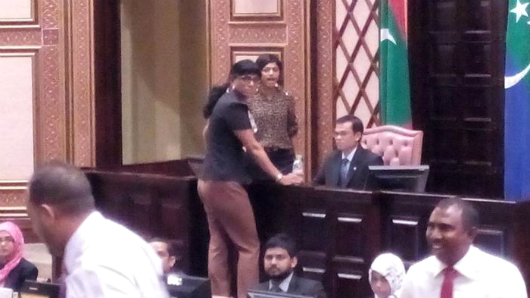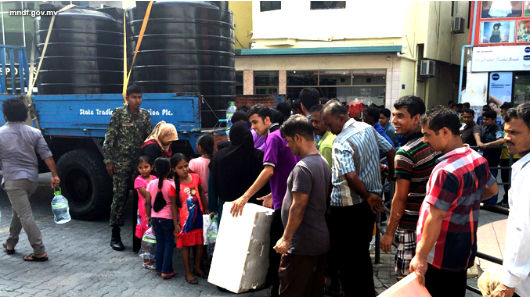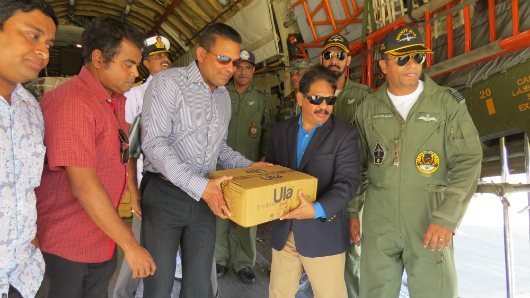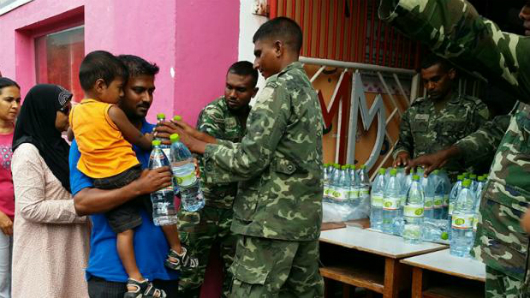Allegation of assault against opposition MPs followed disruption in the People’s Majlis today as MPs attempted to debate the ongoing Malé water crisis.
Water services have been cut off from the capital for six days following a fire at the capital’s sole desalination plant.
The Majlis convened today – with debate on the proposed 2015 state budget and an urgent motion of the water crisis on the agenda. But proceedings were prematurely concluded after numerous points of order were raised by the opposition MPs.
Maldivian Democratic Party (MDP) MP Mariya Didi expressed her discontent that the parliament was receiving running water while water services for Malé residents were disrupted.
“While there is no water for the general public, there is water in the parliament. There is even running water in the toilets,” local media reported Mariya as saying.
This subsequent commotion saw Mariya standing in front of the Speaker of the Parliament Abdulla Maseeh Mohamed in protest, while former Speaker of the Majlis and MDP MP Abdulla Shahid has alleged he was attacked by members of the ruling Progressive Party of Maldives (PPM).
Shahid had since submitted a letter addressed to the speaker urging an investigation, while the MDP released a statement condemning the attack on Shahid and alleging an additional attack on Mariya by a pro-government MP.
However, PPM Parliamentary Group Leader Ahmed Nihan has denied the attacks when speaking with local media.
“Shahid started calling for the resignation of the government during the commotion. Some of our younger MPs went near the table and then there were some disagreements,” Nihan told Haveeru.
Questioning the water fund
The MDP also raised several queries regarding the US$20 million ‘Malé water crisis management fund’ set up by the government in order to recover the cost of dealing with the situation.
Speaking at a press conference today, MDP Vice Chairperson Ali Niyaz said that the government’s demands for US$20 million without a detailed breakdown of how the money is going to be spent might lead to corruption.
“Even though MWSC managing director is present during the press conferences, he has not been given any opportunity to speak and we have not received any information on the damages from a technical viewpoint,” complained Niyaz.
Following calls from the defence minister not to politicise relief efforts, Niyaz said that the party is not trying to politicise the US$20 million fund but was demanding answers and correct information from the technical staff at the MWSC rather than the “political figures” in the president’s task force.
The team assigned by President Abdulla Yameen to deal with the crisis includes Minister of Defence Colonel (retired) Mohamed Nazim, Economic Development Minister Mohamed Saeed, Minister of Environment Thoriq Ibrahim, and Minister of Fisheries and Agriculture Dr Mohamed Shainee.
Meanwhile, 5 people were arrested last night at a protest voicing the public’s frustrations with the government’s handling of the water crisis.
A police media official told Minivan News that the people were arrested for disobeying police orders and that all have now been released.
The MDP denied involvement in the protests, saying that the protests did not feature any of the MDP flags and that it was merely people expressing their frustrations with the government.
Related to this story
No fall back for disaster of this magnitude: President Yameen
Government seeks US$20 million in donations to repair Malé’s desalination plant
President Yameen to return to Maldives as water crisis enters third day
UN Maldives commends government’s response in water crisis, opposition condemns




